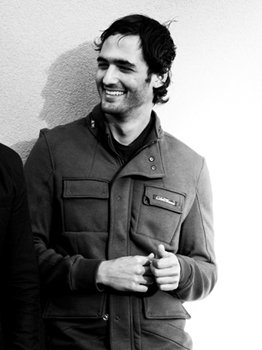Immortalism: Overcoming Biological Limitations
Jason Silva | September 4, 2009
The philosophy that accepts death must itself be considered dead, its questions meaningless, its consolations worn out.”
– Alan Harrington, The Immortalist
“If we lacked humor, given the fundamental terrorizing incongruity of mortality awareness in creatures who dream of immortality, it is questionable whether human beings would have survived at all.”
– Neil Elgee, Laughing At Death
“The common reaction to seeing a thing of beauty is to want to possess it; and yet our real desire may be not so much to own what we find beautiful, but rather to lay a permanent claim to the inner qualities it embodies. We want to give our experience of the sublime weight in our lives.”
– Alain de Botton
“A person spends years coming into this own, developing his talent, his unique gifts, perfecting his discriminations about the world, broadening and sharpening his appetite, learning to bear the disappointments of life, becoming mature, seasoned – finally a unique creature in nature, standing with some dignity and nobility and transcending the animal condition, no longer a complete reflex, not stamped out of any mold – and then the real tragedy: That it might take sixty years of incredible suffering and effort to make such an individual, and then he is good only for dying.”
– Ernest Becker discussing Andre Malraux
The mindset of an Immortalist is pretty simple and straightforward: death is an abhorrent imposition on a species able to reflect and care about meaning. Creatures that love and dream and create and yearn for something meaningful, eternal and transcendent should not have to suffer despair, decay, and death. We are the arbiters of value in an otherwise meaningless universe. The fleeting nature of beautiful, transcendent moments feeds the urge for man to scream: “I was here; I felt this and it matters, goddamn it!” In the face of meaningless extinction, it’s not surprising that mankind has needed to find a justification for his suffering. Man is the only animal aware of his mortality –- and this awareness causes a tremendous amount of anxiety, anxiety that we have to do something about.
As a child I wanted to understand the world. Nothing much has changed. The sense of urgency has not dissipated. I’m still running around desperately trying to understand things. To have emerged –- to be self-aware, to know that I know that I am –- all these things were troubling mostly because they fueled the panic over having some semblance of control over my experience.
When I first understood what love was, on a visceral level — that was when I first grasped the concept of death. Death felt real when I pondered losing someone I loved. It was unbearable to imagine that everything and everyone I loved was temporary, even as a young child. Very early on, I comprehended mortality intellectually. I suppose many of us repress this awareness and comfort ourselves with stories, orthodoxies, and songs – but I couldn’t. That felt like a cop out.
We can dance, skydive, travel, drink wine, get high… But when we pause for just a moment –- a faint disquiet begins to intrude.
Not that my life isn’t sunny and lusty, packed with fascinating hours. It is. Everybody has the chance to turn his span into an adventure, filled with achievement and love-making. We can dance, skydive, float in space, build marvelous jetliners, travel, drink wine, get high, write poems together, and more. We’ve never had such a variety of music, art, and dance as today. But when we start to grow a little older –- and when we pause for just a moment –- a faint disquiet begins to intrude on all our scenes.
Alain de Botton, in his book The Art of Travel, says, “If our lives are dominated by the search for happiness, then perhaps few activities reveal as much about the dynamics of this quest — in all its ardor and paradoxes — than our travels. They express, however inarticulately, an understanding of what life might actually be about, outside the constraints of work and the struggle for survival.” I would go further and say that when we travel we are so immersed in the present moment; so fully stimulated by the newness of the here and now – that for a while we step off the moving walkway that carries everyone else towards death. Movies like Richard Linklater’s Before Sunrise always made me feel this way. It involved two people falling in love while traveling and exploring a new city – and it was intoxicating. That one night tasted like forever. That was a sampler of immortality, and sadly, it ended all too soon.
The psychologist Ernest Becker wrote in his Pulitzer Prize winning book, The Denial of Death, that in the face of an acute and agonizing awareness of his mortality, man has developed three main devices to sustain his sanity: the Religious, the Romantic, and the Creative. These illusions act as temporary solutions to the problem of death. Let’s take a look at each one of these in turn.
The Religious Solution – “God will Save Us”
The Religious Solution has man inventing the concept of God and projecting onto it the power to grant us what we all really want –- the ability to bestow eternal life on ourselves and our loved ones, and to be free from disease, decay and death. The belief in an all-powerful God made perfect sense during the dark ages when people lived short, miserable, disease-ridden lives. With no explanation for their suffering, people were better able to bear their hardships by having faith in God and believing that –- in the end –- their God would “save” them.
However, God never came. Suffering persisted, and people lived and people died.
In an age of science and reason, however, the Religious Solution has all but become obsolete. The irrationality of religious dogma has become clear in our modern time of scientific enlightenment, and – rather than alleviating our anxiety – it has only served to exacerbate it. In his book The Immortalist. Alan Harrington wrote, “Anxiety increases with education. As we grow more sophisticated, ever more ingenious rationalizations are needed to explain death away.” Man still needs something to believe in, it seems.
The Romantic Solution –- “Love is Eternal”
Enter the Romantic Solution –- the second illusion identified by Becker. When we no longer believe in God, we then turn our lovers into gods and goddesses. We idolize them and write pop songs about being saved by their love. For a little while, we feel immortal – like gods beyond time. “Once we realize what the religious solution did, we can see how modern man edged himself into an impossible situation,” says Becker. “He still needed to feel heroic… to merge himself with some higher, self-absorbing meaning, in trust and in gratitude…Yet if man no longer had god, how was he to do this?”
The answer to Becker’s question is simple. Man did it by turning his beloved into god: “If the love object is divine perfection, then one’s own self is elevated by joining one’s destiny to it,” Becker continues. All our guilt, fear, and even our mortality itself can be “purged in a perfect consummation with perfection itself.” And the Oedipus complex can now be understood for what it really is, says Becker, “… another twisting and turning, a groping for the meaning of one’s life. If you don’t have god in heaven, an invisible dimension that justifies the visible one, then you take what is nearest at hand and work out your problems on that.”
Harrington offers his own take on the Romantic Solution to demonstrate how romance manifests itself. “Sensuality may turn into a feverish hunt for rebirth,” says Harrington. “In carrying on this search, men and women depend increasingly on sexual symbolism. The sexual partner turns into a stand-in for various dream figures, phantasms in a stage-managed resurrection. These figures are all agents of immortality to be conquered or succumbed to many times over, in order that the pilgrim without faith may symbolically die and live again.”
We all know how this feels. Jose Ortega y Gasset calls it the “beaming forth of a favorable atmosphere.” But it goes way further than that. When in love, Becker says, “man can forget himself in the delirium of sex, and still be marvelously quickened in the experience.” We are temporarily relieved from the drag of “the animality that haunts our victory over decay and death.” When in love, we become immortal gods.But no relationship can bear the burden of godhood. Eventually, our gods/lovers reveal their clay feet. It is, as someone once said, the “mortal collision between heaven and halitosis.” For Ernest Becker, the reason is clear: “It is right at the heart of the paradox of man. Sex is of the body and the body is of death. Let us linger on this for a moment because it is so central to the failure of romantic love as the solution to human problems and is so much a part of modern man’s frustrations.”
This is the revelation we all come to in a romantic relationship when sex is revealed to represent “species consciousness” –= a mere process of reproduction in service of propagation, rather than in the service of “man as a special cosmic hero with special gifts for the universe…” Man is revealed to be a mere link in the chain, with no lasting purpose or significance. Passionate love then tends to transition into housekeeping love –- boredom and routine coupled with the impossible standards we have for our lovers collides in a flurry of disappointment, and perfection begins to show its cracks.
This is why most marriages end in divorce and why love doesn’t ever quite seem to last forever.
The Creative Solution – “My Art will Last Forever”
At this point in his analysis, Becker identifies the last illusion man has devised — the Creative Solution. He explains our urge to leave a legacy –= to create a great work of art that has lasting impact and value, something that carries our signature and lives on after we’re gone. “This is the artist’s way of scribbling ‘Kilroy was here’ on the wall of the final and irrevocable oblivion through which he must one day pass,” Harrington explains. This is quite touching and clever, and not surprising, but ultimately it fails where it counts: you still die.
The absurdity and ache of our condition can be summed up by the opening line from the award-winning 2006 documentary Flight From Death narrated by Gabriel Byrne, “To have emerged from nothing; to have a name, consciousness of self, deep inner feeling; an excruciating yearning for life and self-expression. And with all this; yet to die. Human beings find themselves in quite the predicament. With our minds we have the capacity ponder the infinite, seemingly capable of anything, yet we’re housed in a heart-pumping, breath-gasping, decaying body. We are godly, yet creaturely.”
The rationalization of death as a “good” thing is no more than a complacent nodding resignation unto nothingness –- just another device to justify and put the absurdity of our mortality out of our minds. Religion often goes farther in this glamorization of oblivion. In his essay, “The Ideology of Death,” the philosopher Herbert Marcuse explains our bizarre rationalization of death, “The exhortation to make death one’s own is hardly more than a premature reconciliation with unmastered natural forces. A brute biological fact, permeated with pain, horror, and despair, is transformed into an existential privilege. From the beginning to the end, religion has exhibited this strange masochism.”
Neil Engee, in his essay “Laughing at Death,” amplifies this theme, “The dread of death is terrifyingly magnified when we consider the possibility that our life and death could be insignificant in a meaningless indifferent universe. Participation in the transcending cultural drama lends us meaning and enables us to keep such dark concerns out of mind, unconscious, suppressed by the security blanket of social verities enfolding us in comforting embrace.”
There are other ways we hide from mortality in contemporary life. “The disco has become an electric art form,” Harrington rails. “We loosen our anxieties with the help of enormous guitars in a temple of fragmentation.” These assaults on our senses all have one purpose, “to smash the separateness of everyone present; to expose feeling and break through thinking; to make us live, in the phrase of Alan Watts, ‘a perpetual uncalculated life in the present’… all this too amounts to one more attempt to hide from the end; a sort of electronic Buddhism in place of sequential perception.”
The Immortalist Solution – “Overcoming Biological Limitations”
The Immortalist Solution is simply this: the time has come for man to get over his cosmic inferiority complex. To rise above his condition – and to use technology to extend himself beyond his biological limitations. “We must never forget we are cosmic revolutionaries, not stooges conscripted to advance a natural order that kills everybody,” says Harrington.
While Ernest Becker identified our need for heroism and our extensive attempts to satisfy it symbolically, Alan Harrington proposes that we move definitively to engineer salvation in the real world. He proposes that we move directly to physically overcome death itself, “Spend the money, higher the scientists and hunt down death like an outlaw.” Where some cry heresy and gasp in protest at the pretense of “playing god,” Harrington simply states, “The truth is, of course, that death should no more be considered an acceptable part of life than smallpox or polio, both of which we have managed to bring under control without denouncing ourselves as pretentious.”
Harrington also suggests that what must be eliminated from the human drama is, “the inevitability of death as a result and natural end of the aging process.” He is speaking of the inescapable parabolic arching from birth to death, “being alive now, ungoverned by span, cycle or inevitability. …Civilized man’s project will no longer be, as Freud suggested, to recover his lost childhood, but rather to create the adult equivalent: an immortal present free from the fear of aging and death,” Harrington continues.Harrington also rails against any philosophy that teaches complacency. “All philosophical systems insofar as they teach us sportingly to accept extinction are a waste of time,” he writes. “The wisdom of philosophers may nearly always be found trying to blanket our program to conquer death.” He critiques men that propose surrendering to the “eternal now,” stating, “Alan Watts and Norman O. Brown write passionately, with intimidating erudition, about the unimportance of erudition. Supremely self-conscious and egocentric men advance themselves, their systems and anti-systems, never stop talking, all the while insisting that the mind should be retracted, the intellect forsaken, and that everyone should instead worship the sensuous present.”
Harrington then continues by critiquing those who embellish “nothingness.” He says, “Voices preaching false consolation will not help us, no matter how skillfully and soothingly they arrange nothingness.” This includes thinkers like Alan Watts, who claims, “… death seems simply to be a return to that unknown inwardness out of which we were born.” Harrington dismisses such statements as verbal valium when he states, “This may be appraised as fine writing, but it serves also to glamorize death, and therefore, in the context of humanity’s mission to conquer death, to weaken and tranquilize our rebellion.”
Harrington is not the only one who thinks this way. “Eternity, eternity! … that is the supreme desire! The thirst of eternity is what is called love among men… nothing is real that is not eternal,” says Miguel de Umamuno in his book “The Tragic Sense of Life.” Our anguish as human beings is articulated by this rant. Unamuno continues, “The world is made for consciousness… A human soul is worth all the universe.”
In Summary
The Immortalist point of view can be summarized as a project that uses technology to “Individualize eternity, to stabilize the forms and identities through which the energy of conscious life passes.” This is hardly a stretch for human beings, says Harrington: “We have long since gone beyond the moon, touched down on mars, harnessed nuclear energy, artificially reproduced DNA, and now have the biochemical means to control birth; why should death itself, ‘the last enemy,’ be considered beyond conquest?”
Once again, to quote Harrington, “Salvation belongs to medical engineering and nothing else; man’s fate depends first on the proper management of his technical proficiency; we can only engineer our freedom from death, not pray for it. The beautiful device of tragedy ending in helplessness has become outmoded in our absurd time, no longer desirable and not to be glamorized. The art that embellishes death with visual beauty and celebrates it in music belongs to other centuries. Anything that celebrates or bemoans our helplessness has gone as far as it can. We are done teaching accommodation to death and granting it static finality as the ‘human condition’.”
In closing, I want to leave you with this biting and eloquent passage I read somewhere on the Internet:
“There is nothing about death that is less than abominable. I am forever bewildered by the placating palaver wasted in efforts to quell this irrational horror. The cessation of all that is, the chasm that devours every memory, every fleeting intellection, every redeeming fragment of meaning and love and lust and friendship and hunger and hopeless vitality, and reduces it all to the inconceivable cosmic ash of nothing—That is my enemy.”




